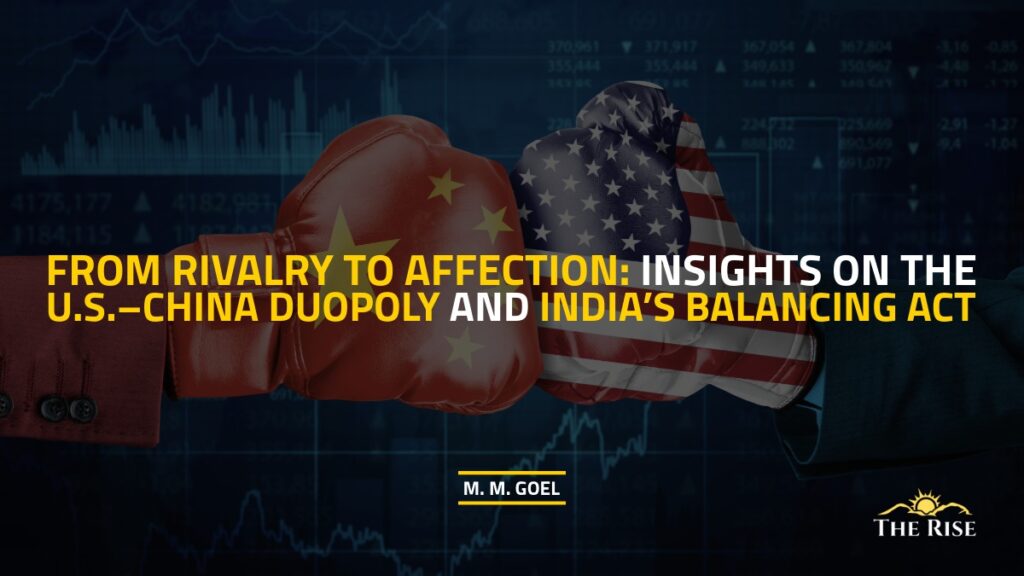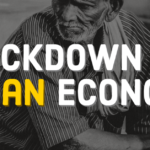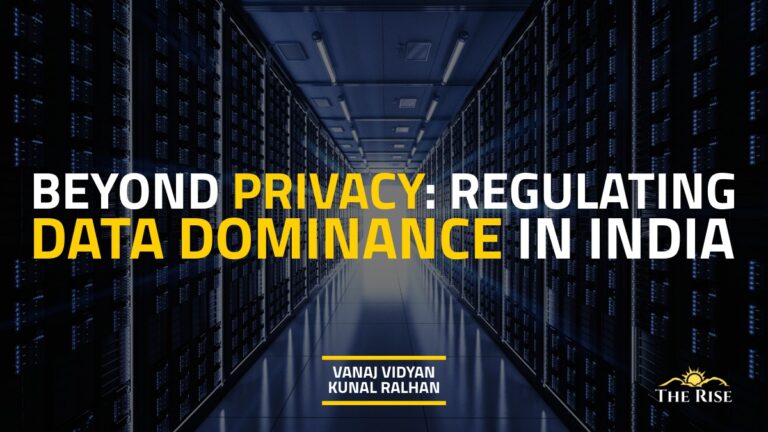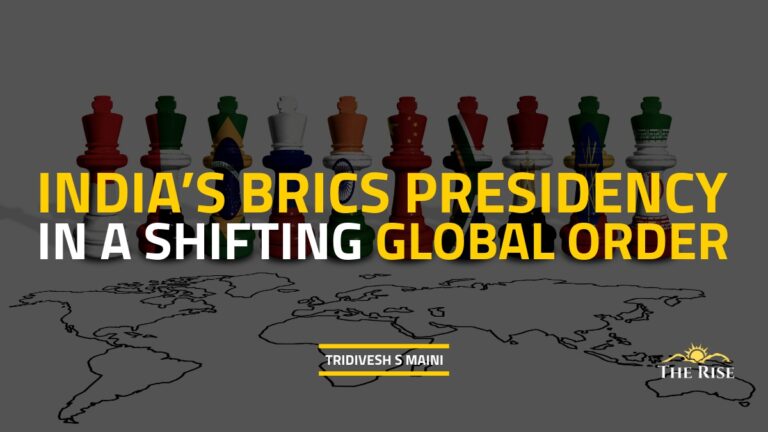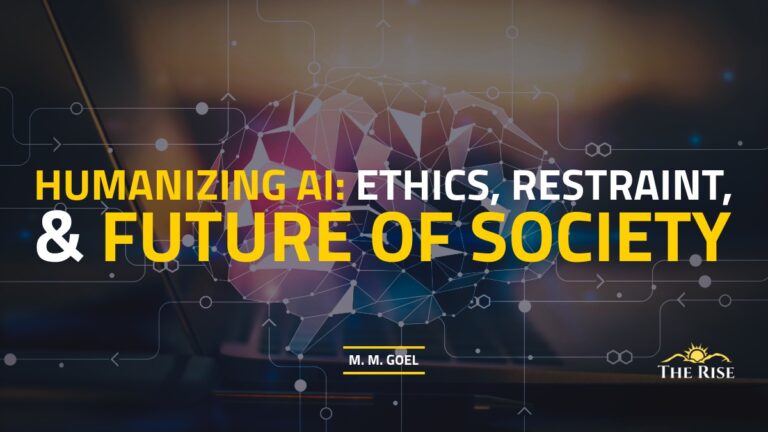Needonomics School of Thought believes that the real progress of humankind lies not in competition but in cooperation, not in domination but in dialogue. The United States and China must realize that peace, stability, and genuine understanding are far more valuable than transient economic victories. If both nations approach their relationship with transparency and sincerity, the global economy could enter a new phase of sustainable and inclusive prosperity.
Needonomics School of Thought (NST) views the evolving US–China duopoly, often described as the G2, as a defining reality of the 21st-century global order. This strategic alignment between the world’s two largest economies carries profound implications not only for global trade, technology, and security but also for the moral and human dimensions of international relations. The open embrace of China by U.S. leadership—particularly under Donald Trump, once known for “tariff terrorism” that disrupted the world economy, including India—marks a significant shift in global power dynamics. What appears on the surface as a tactical ploy may, in the long view, be an attempt by both nations to find a stable and peaceful coexistence in a multipolar world struggling for equilibrium.
Reality of G2 Duopoly
In the past decades, the world economy has been largely shaped by the interplay between the United States and China—one representing advanced capitalist innovation and consumption-driven growth, and the other symbolizing state-led industrial expansion and manufacturing prowess. Despite ideological differences, the interdependence between the two nations is undeniable: China remains one of the largest holders of U.S. debt and a key supplier to its markets, while the U.S. continues to be a major destination for Chinese exports and technology investments.
This symbiotic relationship, often marked by competition, confrontation, and cooperation, defines the contemporary global economic architecture. Under a Needonomics lens, this duopoly represents both an opportunity and a challenge—an opportunity for collaborative growth if guided by honesty and mutual respect, and a challenge if driven by greed, domination, or geopolitical egoism.
NST believes that the real progress of humankind lies not in competition but in cooperation, not in domination but in dialogue. The G2 must realize that peace, stability, and genuine understanding are far more valuable than transient economic victories. If both nations approach their relationship with transparency and sincerity, the global economy could enter a new phase of sustainable and inclusive prosperity.
Trump’s Paradox and Changing Face of U.S.–China Relations
The U.S. leadership under Donald Trump initially projected hostility toward China through trade wars, technology bans, and tariffs—a phase described aptly by NST as “tariff terrorism.” Yet, the later political rhetoric of openness and engagement with China reveals the paradox of global politics: nations oscillate between rivalry and partnership depending on the needs of their economies and domestic compulsions.
For the Needonomist thinker, this shift should not be viewed cynically but rather as a reflection of pragmatic interdependence in a globalized world. When the U.S. and China choose cooperation over confrontation, it reduces uncertainty, restores investor confidence, and strengthens global value chains disrupted by protectionist impulses. The real test, however, lies in whether this partnership is guided by honest intentions or strategic expediency.
If the G2 partnership becomes a trust-based collaboration, it can lay the foundation for a more stable international order. But if it remains transactional, motivated by short-term political gains, it risks deepening inequalities and marginalizing developing nations like India.
Implications for India: Challenges and Opportunities
For India, the rise of a functional U.S.–China duopoly presents both strategic challenges and moral lessons. On the surface, India might appear to occupy a secondary status in this emerging power structure. However, NST urges that India should approach this new reality not with fear or resentment but with hope and optimism. The G2 dynamic does not diminish India’s role; it invites India to play a constructive, human-centric, and moral leadership role grounded in the principles of Needonomics.
In economic terms, India must continue strengthening its domestic capabilities, fostering self-reliance (Aatmanirbharta) without isolation, and expanding its soft power rooted in culture, ethics, and compassion. The G2 competition provides India opportunities to act as a balancing force, maintaining cooperative engagement with both sides while pursuing its independent economic and strategic interests.
Politically, India’s democratic values, demographic dividend, and digital potential make it a natural partner for both the U.S. and China. However, India’s distinct advantage lies not in hard power but in humanistic diplomacy—a diplomacy of empathy, non-violence, and balanced reasoning inspired by the Bhagavad Gita and Anu-Gita.
NST Mandate: “China – Come Home, I Need Affection”
NST puts forth a profound philosophical message in the form of the phrase:
“China – Come Home, I Need Affection.”
This is not a call for submission but an invitation for affectionate engagement. It symbolizes India’s readiness to embrace dialogue over discord, affection over aggression, and cooperation over confrontation. India, in the Needonomics vision, must act as a moral mediator—a nation that builds bridges, not walls, between superpowers.
By extending this emotional diplomacy, India reinforces the ancient wisdom of Vasudhaiva Kutumbakam—the world as one family. True affection between nations cannot be based merely on economic interest; it must rest on trust, mutual respect, and shared humanity. When love and empathy guide foreign relations, the politics of fear and exploitation can transform into partnerships of purpose.
Paradox of Peace: U.S. Department of War Working for Peace
NST also draws attention to a striking irony in the global system: the United States, the self-proclaimed promoter of global peace, operates through a Department of War. This paradox captures the essence of modern power politics—where peace is often pursued through deterrence, not dialogue. Needonomics rejects this contradiction and calls for a new global ethic where peace is pursued as an end in itself, not as a by-product of power balancing.
A Needonomist world order envisions peace through understanding, not through weapons; prosperity through cooperation, not competition. The G2 relationship, if built on sincerity, can model this transformation for the world. Yet, this requires a fundamental shift in mindset—from materialism to moralism, from greed to need, and from self-interest to shared interest.
Conclusion
The duopoly of the U.S. and China may shape the contours of the world economy, but it need not define its soul. The Needonomics School of Thought reminds us that true global leadership is not measured by GDP or military might, but by the capacity to nurture peace, harmony, and human dignity.
If the G2 can rise above suspicion and ego to build a systematically cooperative relationship, the benefits will extend to all—especially to developing nations like India, which seek a fair and stable global order. India’s response must be guided by wisdom, restraint, and affection. As NST proclaims, the way forward for India is not confrontation but compassionate engagement, inspired by the eternal truth that intentions matter more than perfection.
The world today does not need another cold war—it needs warm hearts and wise minds. Needonomics offers that middle path: an economics of balance, a diplomacy of affection, and a vision of peace sustained by the power of honest intentions.
Disclaimer: The views expressed in this article are those of the author solely. TheRise.co.in neither endorses nor is responsible for them. Reproducing this content without permission is prohibited.
About the author
Prof. Madan Mohan Goel, Former Vice Chancellor and Propounder of Needonomics School of Thought.

